Faith with Both Eyes Open

Examining Malcolm and Simone Collins' Religious Project
The other day I saw Malcolm Collins’ most recent article in Aporia. It's worth a read, albeit still quite frustrating in some of its assumptions. A lot of people have been asking me about Malcolm and Simone Collins, the authors of pronatalist.org and creators of Based Camp. And this is probably as good a place as any to discuss my feelings on the pair.
Like the Giant Squid and the Duck-billed Platypus, Malcolm and Simone Collins are like one of those baffling, supposedly mythical creatures, which explorers later discovered to be real. Blue state secular corporate culture types that nevertheless have a large family and are concerned about 21st century family collapse? Hypothetically, I always knew that there must be some set of people who fall into this category. But I never expected to meet one face to face.
Still, Malcolm and Simone Collins fit the bill. They are certified pro-natalists, with a gaggle of kids, yet somehow embody every West Coast cultural affectation, for better or worse. I very much respect the Collins' work. And, despite their quirky appearances and grating Silicone Valley mannerisms, their organizational work on the problem of the fertility collapse has been invaluable. Furthermore, despite my own cultural self-hatred, as a Californian it is refreshing to see that at least some people from my native land are taking the survival of our way of life seriously.
However, at a philosophical level, there is something deeply misguided about the Collin's approach to addressing family decline that is very much on display in their most recent article.
True to their backgrounds in the Venture Capital world, the Collin's solutions to the failure of progressive modernity is to double down on its methods; be more modern than modernity; apply progressive technical solutions to the issues only traditionalists still seem to care about. After all that's what works isn't it? That's what built the wealth of the modern world and the America of the late 20th century. It's the “best practice”.
But perhaps not. As even Malcolm Collins will admit, modern nation states have been implementing sundry technical solutions to the problem of fertility collapse for the last century with very few results to show. In fact, the only communities insulated from the problem are traditional religious communities who have avoided the modern world’s infertility crisis by side-stepping modernity itself.
I guess Oswald Spengler could have told us as much about the fundamental sterility of civilized man. And, for the more reactionary among us, the decline of modern cultural systems in the wake of modern problems may seem like a solution in itself. Isn't it easier to live and let die?
But this fatalism is less enticing for native Blue-staters, more so for people like Malcolm Collins who see something essential in the values of the 20th century, worth preserving.
I sympathize with the Collin's problem. Much less so with their solution, which seems to be reverse-engineering pre-modern lifestyles in an attempt to graft progressive cultural tropes into the root of a fundamentally non-progressive lifestyle.
Collins’ effort begins with redesigning a new religion, adequately hacked to procure all the fertility benefits of a devoutly traditional faith without any of the nasty, non-progressive sensibilities that might trouble the modern liberal mind. Perhaps, as Malcolm Collins hopes, this will be just the ticket to guide human civilization to the stars with its fecundity and liberal convictions intact.
I can’t help but repeat once more that I find the Collins’ endeavor to be laudable. Its cultural uniqueness alone makes me reluctant to dig in with a deep criticism. Wouldn’t a critique embody some cosmic ingratitude in the face of these unusual thinkers trying to develop a different approach to our problems? Like an traveler discovering Dr. Doolittle’s Push-me-pull-you and then complaining about its uneven gait?
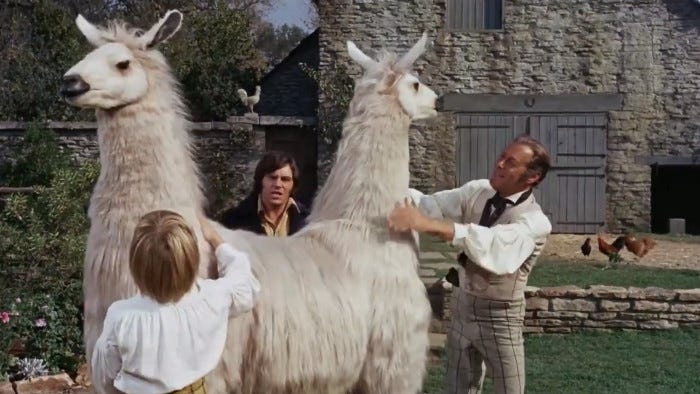
Still, it needs to be said that Collins is pursuing an entirely Sisyphean project that will inevitably encounter failure as it tries to bridge a fundamental contradiction through the application of mere effort and optimism.
First, we need to start with some historical awareness. This begins with understanding that the project of trying to "invent a better" religion is far from a novel concept. In fact, Western man has been trying to design more enlightened versions of traditional faith for centuries now, from the early days of the Free Masons all the way to L. Ron Hubbard.
Did these projects have their intended results? Not generally.
So how will our new projects overcome the failures of the old? No answer.
So once more we return to that familiar 21st century game, where people attempt oft-tried fruitless endeavors while telling themselves "This time it will be different". This idea generally hasn’t worked in the past. But it might work for us?
The shadow of Tobias Funke looms large over our generation.
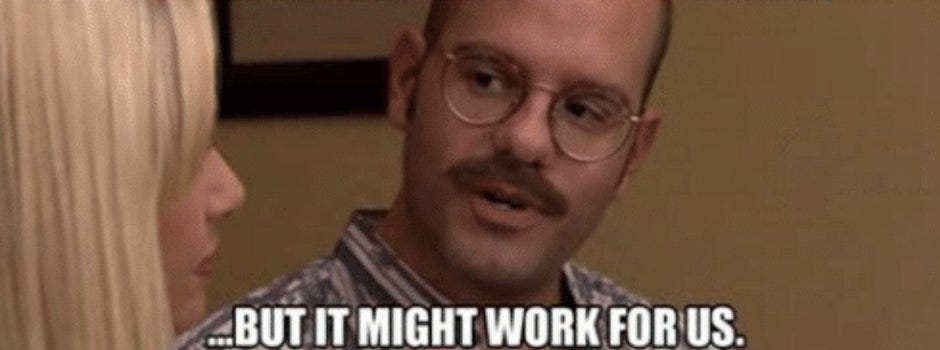
In last months' essay, I noted: "Organic systems cannot simply be scooped out of their context and replaced by a formal set of rules while still maintaining their ability to be lifelike". Faith is a good example of such an organic system. Even disregarding the sacrilegious nature of trying to design an artificial religion for utilitarian ends, a manufactured piety would never be fit for the basic purposes of its designers.
It’s easy to see the problem if you examine the qualities which distinguish traditional religion from other more modern modes of ideology. Religion is inter-generational. Religion frames a community’s collective goals. And religion is fundamentally particular.
Very few other modern systems share these qualities in quite the same way as traditional religion. And unsurprisingly, each of these unique properties is fundamentally illiberal.
Nevertheless, once you try to remove its illiberal elements, the thing doesn't work. You can try to use convoluted work-arounds, but its like trying to tie a false knot, once force is applied it comes undone instantly. Similarly, in his earnestness to optimize the utility of faith, Malcolm Collin’s project unravels the foundational components that makes it work in the first place.
To take an easy initial example, I speculate that Malcolm Collins wants his new faith to be widely accessible to people from different cultures as well as those coming from a secular, post-traditional, world. And he wouldn't be alone in this desire. Many on the secular side of the right have been in search of a "minimal necessary religion". How else could you sell a new faith to elites if it seems too narrow and provincial?
But the necessary result of such a minimization process is a highly generalized and vague tradition. And while broad faiths might look good on paper, generalized religions are almost always impracticable. That's not how humans work.
Trying to put a minimalist religion into practice is like trying to describe the life of a person with no body. Humans are biologically physical creatures. And religions, as they exist memetically, are particular cultural phenomenon. In real faith, believers often find the deepest meaning in the most specific actions of ceremony and prayer which are deeply connected to a time, place, and geography. This is not a widget that can be swapped out, but part of a delicate spiritual ecosystem
And such an ecosystem can't be shipped with the modern cosmopolitan inclination to “embrace the world”, as the holiness of the small and certain would inevitably be crushed under the scale of cultural dissonance and mass consumerism. Therefore any inherently cosmopolitan religion would either shatter into a thousand pieces or be so vague and abstract as to have no real presence in people's lives.
A similar and more fundamental problem, comes into view when trying to bridge the modern and traditional vision of ethics. After all, religion constrains human will and desire, a function that is anathema to our modern emancipatory concepts of freedom and self-ownership.
Is this just an illusion, simply one innovative fix away from being resolved?
I don't see how.
For whatever else is mysterious about the nature of faith and family formation, it is pretty obvious that it is religion's constraining nature that is the core driver for its sustained birthrates across generations. Faith's effect on human fecundity isn't magical. The religion's power to encourage family formation is brought into communities by an element of cultural coercion that compels individuals to make choices which benefit the community long-term, when they would otherwise act in a more individualistic capacity.
As modern society has demonstrated, when humans are presented with life choices as options on an a la carte menu, with the pleasures purified and the inter-generational consequences removed, young people don't generally choose to have children.
Is that the wrong choice? It’s impossible to say outside of a moral context that modern secularism refuses to provide. The situation certainly doesn't seem to be making people happy. Nevertheless when society defers to “choice”, even “strongly expressed choice”, collective sterility is the mode that human's naturally gravitate towards.
And in the face of this inter-generational drive towards self-termination what barriers can be erected? Traditional religious strictures, certainly. But the strictures don’t work well when you know they are are man-made, much less when you know the man who made them.
Any legitimate source of constraint on human will always be external. Of course we may impose boundaries on ourselves, regimes of discipline and ethics. But the motive to put away the immediately gratifying for something "higher" necessarily comes from a concept of moral elevation conceived as external to the self. We can come up with whatever bullshit we want about having "internal ethical principles", but that's not what generates real self-sacrifice either of the extraordinary kind, like martyrdom, or of the ordinary kind like basic parenthood.
The struggle for modern people (what Nietzsche was referencing with the "Death of God") is that it is almost impossible to approach an external moral imperative without the constant presence of doubt. This creates the subsequent situation where humans naturally return to a base line hedonism paired with a collective death instinct. And while exploring these implications is beyond the scope of this essay, it is important to note that no belief system we create in this age won't be tested through the crucible of constant second-guessing and the temptation to apostatize into apathy.
So is it really surprising how short-lived artificial religions tend to be?
All designers of religion imagine themselves to be forging a faith for the ages, yet few last even in the minds of their own creators. To be real a religion must constrain the will, and so the question of genuine belief can never be sidestepped. That's a hard issue if you literally own the yellow legal pad where you cooked up your doctrines as a means to another theoretical end. And if the prospect is hard for the designer, how much more for the designer’s children, much less their distant posterity.
Does Malcolm Collin's believe that his religion is true? Do his children? And if the answer is anything other than an emphatic "yes", of what good is the project to begin with? If kids don't want to do something hard "because Dad says so" , I can't imagine that "because the god Dad invented says so" will be any more compelling. And while people always find some romance in looking to the faith of their fathers, the romance is somewhat lessened when they know their literal father wrote the scriptures.

It's easy to straw-man the Collin's idealized concept of religion. And this is not my intention. Nevertheless, like noticing Destiny's wife dancing with another man in the background of his livestreams, one can't help inspect these Tobias-Funke style projects for those tell-tale red flags indicating that this iteration will inevitably follow the same doomed trajectory as its predecessors. Sure enough, a big red flag was readily visible in Collin’s recent article.
And if you are interested in the specific religion of our family, we lay it out in a Substack piece titled Tract 1: Building an Abrahamic Faith Optimized for Interstellar Empires. In short, we teach our kids that whatever man becomes in a million or so years will be conceptually closer to what humans today would think of as a God than to a human. This entity is so advanced that it exists outside of time as we understand it and thus, form the perspective of the entity, it is guiding us to reunite with it.
God is the ultimate manifestation of human potentiality, and the good is defined by actions that expand human potentiality. We believe that this is the entity the Abrahamic Traditions1 were revelations of, and that new revelations are given to man when he has the capacity to understand them. Hence we have a religious mandate to expand that capacity (through both genetic and synthetic means). Ours can be thought of as almost an Abrahamic E/Acc religious system.
For those not familiar with that last acronym, “E/Acc” is short for effective accelerationism. You see, it’s like “accelerationism” but it’s got the work “effective” in front of it so you know that it’s good.
Obviously “E/Acc” is very much a derivative concept to “EA” (“effective altruism”), Silicon Valley’s favorite utilitarian buzzword until Sam Bankman Fried crashed the concept with no survivors by using it as a pretense to defraud investors to funnel money to the Democrat party and its aligned NGOs.
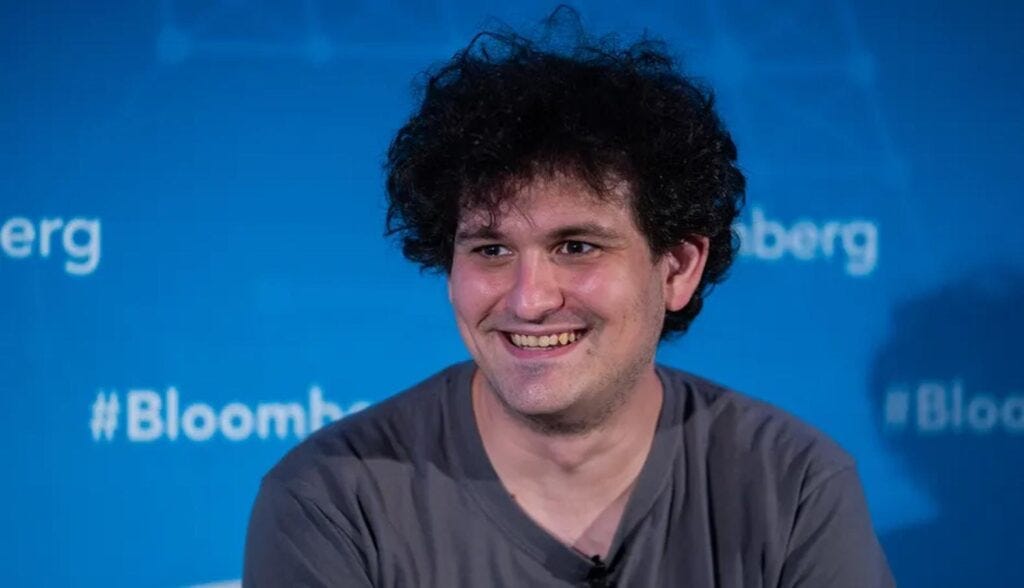
From what I can tell, “E/Acc” tries to fix the the problems with “EA” by rebranding the term and adding on another layer of A.I.-techno-babble to obscure its fundamental vacuity. I guess that approach makes sense. After all, if Google Gemini has taught us anything, it’s that the problem of vague unaccountable ideology is immediately solved by filtering it through a large language “A.I.” model. So like it or not our “EA”s are now becoming “E/Acc”s. At least the name is a cool re-brand.
But Malcolm Collins entire theological approach feels like a re-brand. Modern history buffs will recognize this unnamed “God of potentiality” as very similar to the 20th century’s “God of Progress”. In fact, since the enlightenment, this kind of vague god of providence (in his many different forms) has been Western man’s most popular substitution for a traditional deity. And, to be fair, it is based on a kernel of wisdom. It is the goal of all traditional believers to become more like God, or, put better, to become more Christ-like. And Christians certainly believe there is a God-oriented teleology in history.
However, without a grounding in a deep historical tradition, or a belief in some special divine revelation, the “God of human progress” is spiritual poison, resulting in ruination whenever this idea has been tried. Inevitably the result is either, at best, some feel-good “woo-woo” new age spirituality functionally identical to modern liberalism; or, at worse, a narcissistic revolutionary activism that destroys real and useful human institutions for some unrealizable Utopian end.
Now, perhaps Malcolm Collins is sitting on some great philosophical breakthrough, hitherto undisclosed, that fixes these problems. But if his latest idea works anything like it has in the last 2000-times people have tried it, I can assure you this vague notion of a “God of human progress itself” comes apart the second one examines it honestly.
You can see the issue if you just repeat the idea back to yourself without the hand-waving.
Question: What do you want us to believe in?
Answer: The god of progress in history!
Question: What does this deity command us to do?
Answer: To move future history in god’s progressive direction!
Question: What is the nature of your progressive god?
Answer: Our god’s nature is to embody the progress history is moving towards!
The turtle sits on the elephant. The elephant sits on the turtle. Then it’s turtles all the way down.
This idea takes the same form as many other modern ideas. The concept curves back on itself, never coming to any particular statement or particular place. It is the eternally vacuous self-referential tautology. A woman is whoever calls themselves a woman. A racist is just someone who does a racism. Gender is whatever you want it to be. Every concept is totally circular, concealing an absence at its core.
Really the formula is baked straight into the notion of progress itself, which always chases a meaningless placeholder, to progress in a progressive direction. Really, the fact that we have organized our entire society around pursuing this objective for the last hundred years indicates an inability of our leadership class to come to terms with the real challenge of post-modernity.
But, to avoid digression, I will return to the question of how Malcolm Collins “religion of human potential” operates. Because I still don’t see how the author expects the thing to work properly.
As previously stated, the utility inside of religion is to align individual will to broader cross-generational goals. But, as no one can see the future, the only thing standing in opposition to the individual in the moment is the ancestor, most immediately represented in the form of the parent, which, via the concept of “progress”, is a necessarily less advanced specimen.
Under the framework of divine potentiality, why should a son be beholden to the father? Why should our ancestors hold dominion to veto our desires in the present? Do the dead command the living? Is there something real in the past that is worthy of worship?
There must be something holding a faith of “potentiality” together from one generation to the next, and it certainly can't be a vision of humanity becoming progressively more godlike over time, because under that conception, the current generation of individual actors will always be primary, as their more “progressed” disposition gives them the right to veto the concerns of the past, and mold those of the future.
Thus we arrive back at progressive humanism’s crisis of justification. Fundamentally society needs to provide a serious answer to why anyone should constrain their own desire and follow any ethical system. But, at root this is a religious problem, and not a technical one, and it is therefore impossible to design your way around the issue, even if your technical design has the word “religion” pasted on the front of it.
Originally progressive humanists sought to justify their ethical norms via reference to some conceptually ideal vision of humanity, which history would somehow inevitably restore via providence. Progressivism was a hard sell to many, since the concept contained an obvious level of idealization, and derived its moral vision from Christianity while rejecting the religion’s more regressive elements like original sin. Still, to many others, early progressivism had a certain salience to it as a way to bring Jesus’s promised Kingdom of Heaven into the present, as a lived reality.
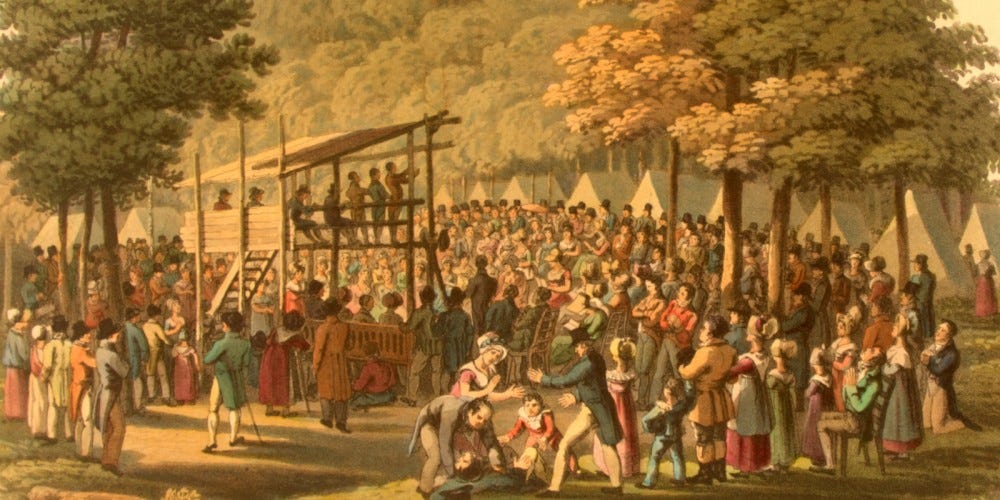
It sounds silly looking back on it historically, but early progressive Christians (and later progressive humanists) believed that this generalized Kingdom of God readily flowed from the pure human spirit, as it was. As such, from the Reformation on down, intentional communities were a staple of progressive ideologies. These were the places of brotherhood and equality that would prove that the progressive religious vision of humanity was achievable imminently, and not in some vague historical dispensation at the end of time as promised by traditional Christianity.
But you don’t see very many intentional communities in 2024, and the progressives who have moved away from Christianity don’t even call themselves humanists anymore. Because as technology increased, as Christianity diminished, and as the full view of multicultural humanity came into view, progressivism shed all of its particular and imminent moral pretenses and gradually became reliant on technocratic developments to smooth out the problems with its policy goals.
Thus across the late 20th century, the progress narrowed its understanding, broadened its promises, and shed whatever organic form it had until its project was reduced to a self-referential point of abstract moralism. For this reason, if no other, the term “singularity” is the perfect analogy for modern progressivism as it resembles nothing more than the center of a black-hole, if not in terms of its gravitational power, than in terms of its infinite smallness and lack of quality. What once was a grounded, if not heretical religious vision, has reduced itself to a microscopic future point of judgement, John Carter’s “Eye at the End of History”.
In 2024 you can barely escape the “Eye at the end of history” as it remains the preferred eschatological faith of our technocratic ruling class. But despite their many academic degrees and high opinion of their own intellects, these techno-prophets, from Yuval Noah Harari to Ray Kurzweil, are pedaling pure bunk.
The problem with their vision of a technological singularity is that it is based on obfuscation. Rather than answering the real questions about human will and teleology, the allusions to a coming “singularity” hides the answer behind a veil of ignorance and then seeks to compel obedience with flashy lights, poorly understood simulations, and appeals to graphs that only ever go up. The process looks fancy, but it’s the same game as the ancient Greeks were playing when they beseeched their oracle from behind a veil. It’s just another mystery cult for another decadent age.
Thus the “Eye at the End of History” is a false god. Not least, because no one who thinks deeply about the idea can take it seriously. No one knows the future, and far from exerting a force on the present, the future outcomes are almost entirely controlled by events in the present. What was that famous line from 1984?
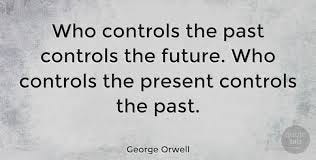
As C.S. Lewis also pointed out in his book, The Abolition of Man, the logical endpoint of progress is ultimately the reification of a single nihilistic present will which disregards all past moralism and bends all future outcomes to its narcissistic aims. Now, perhaps producing some demonic computer overlord is the ultimate objective of the technocrats; however, this outcome could never be called “human” , much less “progressive”. And, as such, humanity’s appeal to a progressive morality will end in futility either way.
But here I must return to the original question about the future of religious faith on the right.
The riddle that both Malcolm Collins and I are attempting to answer, is how to preserve a certain heroic, and vital element of human nature into the future. The mistake made by Collins is that the task of this preservation does not begin with an understanding of “progress” or “potential” but from an understanding of history.
If humanity as a species is to be understood as “good”, it must first be understood across time as an organic living collective, not simply a pre-figuration of some potential. Humanity may change. It may evolve. It certainly does adapt to the ever changing circumstances on Earth, both biologically and culturally. But it is not, inside of these changes, made more or less human, or more or less Godlike. The changes are just circumstantial.
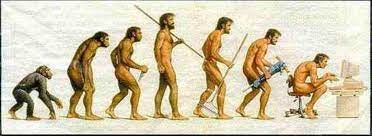
This is not to say that there are no humans who are morally better or worse, or even groups of humans who are morally better or worse, on average. But virtue is not a property of the specimen’s general form. Virtue is a conscious act of the will to put the good first, struggle against circumstance, and sacrifice what is necessary for things that are higher. That is where true heroism is forged. And regardless of whether a person’s (or people’s) circumstances are elevated or degraded, we are all given the same opportunity. All ages are equal in the eyes of history.
Modern man is not better than his primitive ancestors because of his higher IQ, any more than he is worse because his muscles are weaker. Comfortable privileged contemporary people have no right to scoff at their “racist” and “homophobic” grandparents who sacrificed everything to give them what they have. And modern thinkers are not the moral superiors of their ancestors by any condition of history, nor are they the judges of the past.
The only true arbiter of history is God. And God is not a cyclops looking backwards from the end of time, judging people in proximity to Himself. Rather, God has a face with two eyes, a mouth that speaks two words, and a reign that carries two judgments, one at the end of history and one at the beginning, the Alpha and the Omega.
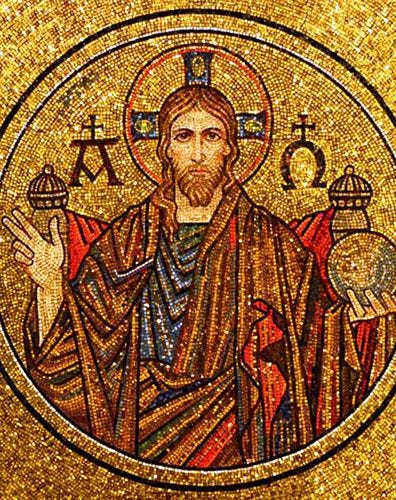
Humanity may rely on what we receive from history as wisdom, just as we may hope for what we could receive from the future as prophecy. But nothing in this process is certain or necessary. And so we do what we always do: living in the context of history, trying to do for those who come after by studying those who have gone before. It is a destiny that we receive, not one that we design.
Right now I want to anticipate an objection, that will naturally be in the mouths of those readers more sympathetic to the Collins’ project. After all, a reader might rightly ask.
Is the vision of humanity we are to embrace really so constrained? Are we to believe that mankind generates nothing, receives everything, and now has nothing to do but put his head down in obedience to unchangeable divine law? Where is the space for innovation and dynamism?
Certainly I understand this criticism, and while I appreciate the religiously austere, I am not commending such a hard line attitude here.
After all faith is not static but dynamic in history, as humanity itself is. While the core truth of religion remains intact and internal, its interpretation sways and shifts, like a wave, the many specific pieces of its wisdom becoming more or less relevant over time. And the human race needs to struggle with it politically. Like Jacob wrestling with the angel, we are contending with forces much more powerful than our own, and our attempts to reform religion need to be approached with a requisite level of humility, like a small man sitting astride a massive elephant.
I suppose this brings me to some concordance with Malcolm and Simone Collins’ vision of a new religion, because I too seek a faith that directly addressees the signs of our time. But while I sympathize with their efforts, I feel that not enough respect is being given to what has already been learned through history.
For instance, apropos of our shared identities as natives of highly progressive communities, I will here assert that there is no relevant modern religious or political movement that doesn’t make the criticism of modern “Blue-State” culture a mainstay of its discourse. American progressivism is the reigning spiritual heresy of our age, and it is the author of most, if not all, of our modern cultural problems. It is the source of the family collapse, rank materialism, and mindless knee-jerk egalitarian thinking that has prevented humanity from seeing critical truths for almost a century.
The problem isn’t just that “Blue” America doesn’t have enough kids. Rather, progressive culture, while once grand, has for decades been transforming itself into something entirely poisonous. No one serious should be looking to graft these progressive values into the future as they are. Instead, our historic moment is the time for progressive culture itself to be put in the docket and answer for its crimes. And I don’t think that the Collins’ have appreciated the magnitude of what this development requires in terms of modifying our own native liberal presuppositions.
However, on a more personal level, I would urge Simone and Malcolm to take a more direct and sincere approach to faith. Before we start designing a new religion to take humanity to the stars, can we pause a moment and talk about what we actually believe? Aside from bland platitudes about humanity exploring space that everyone picked up from Star Trek, what real spiritual goodness are you pursuing? What are the real values that you are fighting for? What do you actually believe? Or, like Bob Dylan asked, “who you gonna serve?”
Because that’s what really defines a religion. Not how “effective” it is, but how it is directed. Show me the nature of the God you revere. Show me what you worship. Show me at least once, the figure to which you submit your own will, the person, necessarily in the past, that you look towards and say: "Not for my glory but for yours, let your will be done."